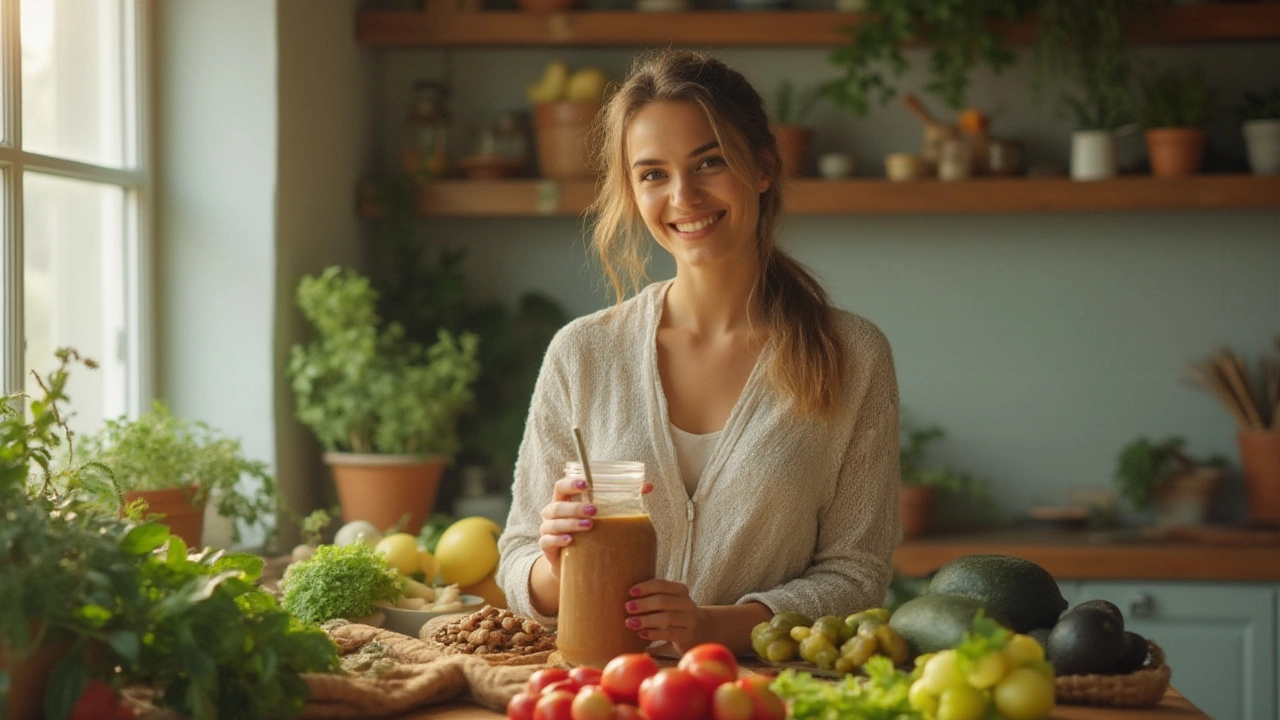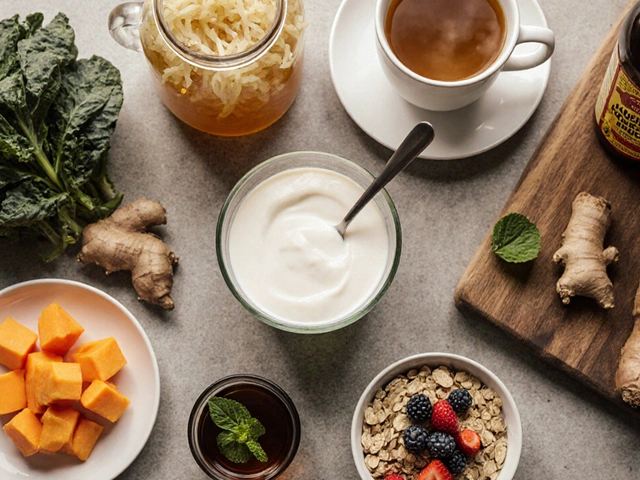
“Vegan face” is a term you won’t find in textbooks, but it’s become a hot topic on social media and plant-based forums. Ever stumble on Instagram and see someone talking about sunken cheeks, sallow skin, or a tired, gaunt look after switching to a vegan diet? People say going plant-based made them look older or somehow “deflated.” But is this really just the price of going vegan? Or can you enjoy the perks of a plant-focused diet and still keep that fresh, healthy face? Let’s unpack what’s really going on here and how to get your glow back if you feel your vegan diet is aging your appearance.
What Causes 'Vegan Face'?
Losing cheek volume or noticing your skin is looking dull can be a gut punch, especially if you switched to a plant-based lifestyle for health reasons. But this so-called “vegan face” is less about being vegan and more about what’s missing in your diet. Here’s the thing: Plants are packed with vitamins, minerals, and phytonutrients, but without careful planning, it’s ridiculously easy to miss out on some crucial stuff your skin and face need.
For instance, not getting enough calories—period—will make you drop pounds from everywhere, including your face. Most people underestimate that eating only vegetables and fruit, without filling up on healthy fats and adequate protein, can leave your body in a calorie deficit. Studies show that sudden drops in body fat can lead to your cheeks looking hollow and make fine lines or under-eye circles jump out.
Protein isn’t just for gym rats; it’s what your skin, hair, and nails are made of. If you’re eating lots of grains, veggies, and fruit but little in the way of tofu, tempeh, lentils, beans, and nuts, you’ll starve your skin of the stuff it needs for structure. Collagen—our skin’s support network—is made of amino acids. While you can’t eat “collagen” from plants, you absolutely can get all the amino acids you need, but only if you plan it out. Miss those, and your skin gets dull and thin, and your face shape can shift.
Then there's fat: omega-3s from walnuts, chia, flax seeds, and algae oil are non-negotiable for full, hydrated skin. Not enough fat means dry, flaking, crinkly skin. And it’s not unusual for newer vegans to cut out oils in a bid for health, not realizing the impact this has on that youthful, pillowy face.
Vitamin B12, iron, zinc, and vitamin D also deserve a shout-out. Deficiencies can sabotage your energy, skin color, and even create those dark under-eye circles, so common with vegan face complaints. A small-scale study out of Finland found that vegans were three times more likely to be low in vitamin B12, a vitamin essential for fresh, vibrant skin.
So, “vegan face” isn’t an inevitable side effect of ditching animal products. It almost always comes down to missing nutrients or calories, not something unique about plants themselves.
How to Fix 'Vegan Face'—Food and Nutrition Edition
Wondering what you can actually eat to ditch the gaunt look? It’s not about abandoning plant-based eating. The fix is about dialing up nutrition, adding missing fats and proteins, and making smarter supplement choices.
- Up your calories: If you’ve lost weight since going vegan, ask yourself if you’re eating enough. Try tracking intake for a few days—you might be shocked at how little you’re getting compared to before. Smoothies with nut butter, olive oil drizzled on veggies, and snacks made with tahini or avocado can add instant calories without you feeling stuffed.
- Focus on protein: The magic number for adults is about 1.0–1.2 grams of protein per kilogram of body weight per day. Toss lentils and beans into lunch, pile on tempeh at dinner, and snack on roasted chickpeas or edamame. Mixing sources—like combining rice and beans—helps you get the complete set of amino acids for healthy collagen.
- Don’t fear healthy fats: Aim for two to three servings of omega-3-rich foods daily. Chia pudding, flaxseed smoothies, sunflower seeds, or a splash of algae oil in salad dressings can work wonders. Coconut yogurt or nut butters are also great for keeping facial fullness.
- Mind your micronutrients: At a bare minimum, every vegan should take a B12 supplement. Bloodwork can spot low iron, zinc, or vitamin D—many folks need a top-up with supplements, especially in winter or if you’ve been tired or pale. Certain fortified plant milks or cereals can help but don’t always bring you up to optimal levels.
- Hydrate inside and out: Plant foods are loaded with water, but don’t forget to drink extra—aim for at least 2 liters a day to keep skin plumped up. Herbal teas count, but sugary sodas are out. Hyaluronic acid capsules or powder, while not a magic bullet, may also keep skin juicier (make sure it’s vegan-sourced).
Here’s a quick nutrition breakdown to keep your face looking lively (per day):
| Nutrient | Recommended Intake | Best Vegan Sources |
|---|---|---|
| Protein | 1.0–1.2 g/kg BW | Tofu, Tempeh, Lentils, Chickpeas, Quinoa, Nuts |
| Omega-3 Fatty Acids | 2-4 g | Chia Seeds, Flaxseeds, Walnuts, Algae Oil |
| Vitamin B12 | 250–500 mcg | Supplements, Fortified Plant Milks |
| Iron | 18 mg (women), 8 mg (men) | Spinach, Lentils, Iron-Fortified Cereals |
| Zinc | 12–15 mg | Pumpkin Seeds, Cashews, Beans |
| Vitamin D | 2000 IU | Supplements, Fortified Foods, Sunlight |
Don’t just guess—get your blood levels checked every year or two and make changes before things go off course.

Skincare and Lifestyle Tweaks for Plump, Healthy Vegan Skin
Food matters most, but what you put on your skin and how you treat yourself day-to-day can give you a serious edge. If things are saggy, textured, or looking tired, it’s time for a full self-care blitz.
- Double down on hydration: Face mists with aloe or rose, plus a rich, unscented moisturizer, can lock water into the upper layers of skin. Glycerin and squalane are vegan-friendly and ace for plumping.
- Retinoids and Vitamin C: Serums with vegan retinol alternatives (like bakuchiol) and L-ascorbic acid can spark collagen production and fight dullness. Go slow—start every-other-night with retinoids, and use sunscreen the morning after.
- Massage matters: Five minutes of facial massage each night gets lymph and blood moving, which does wonders for cheekbones and draining puffiness. Use a jade roller, or heck, your hands work fine.
- SPF, always: The sun is the biggest skin-ager out there. A broad-spectrum mineral sunscreen (look for zinc oxide) keeps free radicals and DNA damage at bay, which helps maintain that firm, youthful look.
- Sleep better, stress less: Poor sleep and chronic stress wreck your face more than any one nutrient can fix. Use blackout curtains, keep your room cool, and aim for a consistent schedule. Meditation and even short daily walks can lower stress hormones that eat away at collagen.
- Skip cigarettes and limit booze: Smoking and boozing are fast tracks to wrinkling and fat loss from your face, no matter what diet you eat.
- Don’t fear a touch of filler: Some ex-vegans choose minor cosmetic fixes like hyaluronic acid fillers or skin boosters to restore lost volume. These treatments are typically vegan-friendly and can tide you over while you rebuild nutrition long-term.
It takes time—sometimes months—to fully see changes once you tackle the root causes. But the combo of inside-out nutrition and smart skin habits pays off big.
Common Myths and Surprising Facts About 'Vegan Face'
The internet is loaded with wild claims about how vegan diets “ruin faces” or cause premature aging. Let’s sort the real from the ridiculous:
- Going vegan always thins your face: Not even close. If you eat enough calories and balance protein and fats, your face can actually look fuller and clearer because of the extra phytonutrients in plant foods. A 2023 survey from Harvard found plant-based eaters reported higher skin satisfaction than omnivores, once their diets were balanced.
- Plants can’t give you good skin: Spinach, sweet potatoes, carrots, and berries are loaded with antioxidants that actually fight signs of aging. Lycopene (in tomatoes), vitamin C (in citrus), and polyphenols (in green tea) are all linked to smoother, more elastic skin.
- All vegans need collagen supplements: Animal collagen powders are everywhere, but your body rebuilds collagen from amino acids. As long as you get enough of those, your body can make its own. Soy products, legumes, and grains are especially good at providing the raw building blocks.
- Only older vegans get "vegan face": Actually, rapid face changes happen in younger folks too, especially if they drop weight too fast or cut out food groups.
- Vegan face is permanent: It’s almost always reversible. Fix your food, give your body time to rebuild, and you’ll see those cheekbones round out and skin spring back in a matter of months.
Here’s a neat fact: studies from the American Journal of Clinical Nutrition suggest that people sticking to a well-planned, calorie-adequate vegan diet have a 25% lower chance of severe facial aging over 10 years compared to those with higher saturated fat intakes. The trick? Balancing your plate and not skimping on the essentials.
And let’s bust another myth while we’re at it: No single “superfood” or serum will reverse months or years of poor nutrition. The only real fix is a consistent, balanced lifestyle. That said, plant-based diets—when done right—stack the odds in your favor for that energetic, youthful glow. So, if you’re dealing with “vegan face,” don’t panic, don’t quit. Just tweak the way you eat, mix smarter skincare habits, and watch your reflection change, one meal and one day at a time.




